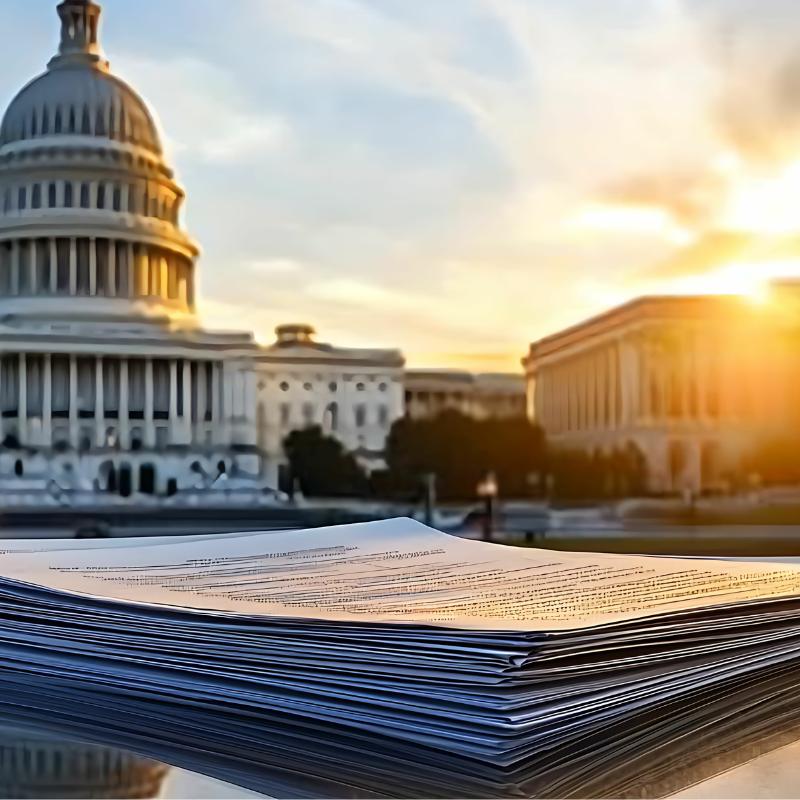The House Ways and Means Committee released additional information regarding their proposed tax bill, named “The One, Big, Beautiful Bill,” on Monday, May 12, 2025. The House Ways and Means committee is expected to start the mark-up of the bill immediately, with the potential of presenting the bill on the House floor for approval next week. While the bill could face additional adjustments in the Senate, it provides the framework for 2025 tax reform. The significant individual income tax provisions are highlighted below.
Individual Income Tax Rates
The House bill makes the regular income tax rate schedule permanent for individuals, estates and trusts, capping the highest federal applicable income tax rate at 37%, as opposed to the 39.6% scheduled to apply in the 2026 calendar year. The proposed bill also provides one additional year of inflation, allowing for larger income tax brackets, except for the 37% tax bracket. The proposed changes are effective for taxable years beginning after December 31, 2025.
| Tax Rate | 2025 MFJ | 2026 MFJ Proposed Income Tax Brackets |
|---|---|---|
| 10% | $0-$23,850 | $0-$24,750 |
| 12% | $23,851 to $96,950 | $24,751 to $100,550 |
| 22% | $96,951 to $206,700 | $100,551 to $214,400 |
| 24% | $206,701 to $394,600 | $214,401 to $409,400 |
| 32% | $394,601 to $501,050 | $409,401 to $519,850 |
| 35% | $501,051 to $751,600 | $519,85 to $767,150 |
| 37% | $751,601 or more | $767,150 or more |
Standard Deduction and Personal Exemption
The House proposal permanently increases the standard deduction amount and modifies the indexing for inflation. In addition, in the case of taxable years beginning after December 31, 2024, but before January 1, 2029, the standard deduction will be increased by $2,000 for married filing jointly individuals and $1,000 for single taxpayers.
The basic standard deduction for taxable years beginning in 2025 will increase to $16,000 for single taxpayers (previously $14,600 in 2024) and $32,000 for married filing jointly returns (previously $29,200 in 2024).
The house also included an increased deduction for individuals who have attained the age of 65 for taxable years beginning after December 31, 2024, and before January 1, 2029, referred to as the senior bonus amount. An additional $4,000 will be allowed per senior, with a reduction of the $4,000 starting when modified adjusted gross income exceeds $75,000 ($150,000 in the case of a joint return). The additional standard deduction is not available to seniors with modified adjusted gross income that exceeds $175,000 ($250,000 if married).
Itemized Deductions
The House bill eliminates miscellaneous itemized deductions previously suspended for taxable years between December 31, 2017, and January 1, 2026. Miscellaneous itemized deductions include investment expenses, legal fees and unreimbursed employee business expenses.
In addition, the proposal repeals the Pease Limitation and instead implements an overall itemized deduction for persons who fall under the 37% income tax bracket. If applicable, an individual’s itemized deductions must be reduced by 2/37 for the lesser of the total amount of itemized deductions for the year or the amount of income that exceeds the 37% tax bracket ($767,150 for married filing jointly or $639,375 for individuals). The reduction aims to limit itemized deductions for persons in the 37% tax bracket, only to receive a 35% benefit for their itemized deductions. The overall itemized limitation would apply for taxable years beginning after December 31, 2025.
State and Local Income Tax (“SALT”) Cap
The House bill would increase the overall limitation of state and local income taxes (“SALT”) when utilizing an itemized deduction for taxable years beginning after December 31, 2025. Under the proposed bill, any specified taxes are limited to $30,000 (or $15,000 in the case of a married individual filing a separate return).Based on the current proposal, the $30,000 limitation will apply whether single or married. Specified taxes include state and local real property taxes, personal property taxes, income taxes and sales tax paid by individuals.
The state and local tax reduction will be reduced by 20% of the excess of the taxpayer’s modified adjusted gross income over $400,000, but cannot go below $10,000. For example, if the taxpayer’s modified AGI is $450,000, the $30,000 SALT cap would be reduced to $20,000 (30,000-($50,000 x 20%)).
The House proposal allows businesses deemed Section 199A qualified trade or businesses not categorized as a specified service trade or business (“SSTB”) to avoid the overall limitation. Instead, Section 199A qualified trade or businesses can continue to deduct pass-through entity tax payments paid at the business level as an above-the-line deduction, not as an itemized deduction.
However, to the extent a pass-through entity tax payment is made at the business level for an SSTB, the $30,000 SALT cap will apply. SSTB businesses include businesses performance of services in the fields of health, law, engineering, architecture, accounting, actuarial science, performing arts, consulting, athletics, financial services, brokerage services or any trade or business where the principal asset of such trade or business is the reputation or skill of 1 or more of its employees are considered SSTB’s, and would no longer be allowed to deduct all state and local income taxes paid at the entity level, but instead be limited to the $30,000 SALT cap.
Get the Latest Tax and Legislative Developments
Withum’s National Tax Policy and Legislative Updates Resource Center is your go-to source for timely updates on tax law and legislative changes. Our team is closely monitoring sweeping tax reform changes, shifting tariffs and tax industry updates, delivering in-depth analysis and actionable insights.
Excess Business Loss Limitation
Under current law, an excess business loss is not allowed for non-C corporation taxpayers. An excess business loss is limited to the threshold amount of $626,000 for a joint return (or $313,000 for other taxpayers) for the 2025 taxable year. To the extent that any loss is in excess of the threshold amount, it is currently treated as a net operating loss in the subsequent taxable year. This allows the loss to offset income other than trade or business income in future years. The excess business loss limitation rule is applicable for effective taxable years beginning after December 31, 2020, and before January 1, 2029.
The House proposal would make the excess business loss rule permanent. In addition, the House bill proposes that any excess disallowed loss created for taxable years beginning after December 31, 2024, must be included in the subsequent year’s testing of the excess business loss limitation. In other words, any disallowed loss created due to the excess business loss rule can only offset business income in the future and will not be allowed to offset non-business income in future years.
Estate and Gift
The House proposal permanently increases the estate and gift tax exemption to an inflation-indexed $15 million ($30 million for married filing jointly) for taxable years beginning after December 31, 2025. The current law provides for the estate and gift exemption to be significantly reduced in 2026, with the 2026 projected amount to be $7.14 million (or $14.28 million for married filing jointly taxpayers).
The proposed $15 million exemption amount ($30 million for married filing jointly) is indexed for inflation with a base year of 2025. Accordingly, the exemption amount is $15 million for decedents dying and gifts made in calendar year 2026 and increases with inflation thereafter.
No Tax On Tips
The House bill includes a new tax law allowing an individual in an occupation who traditionally and customarily receives tips to deduct tip income from federal taxable income for taxable years beginning after December 31, 2024. A list of the included occupations is expected to be provided by the Treasury Department within 90 days of the bill’s enactment. However, the law does not allow tips to be excluded if earned by an SSTB under Section 199A.
The taxpayer receiving the tips cannot be considered a highly compensated employee, which is defined as an employee who is compensated in excess of $160,000 for the 2025 taxable year. In addition, any tips excluded must be included on a Form W-2, 1099-K, 1099-NEC received by the individual or reported by the taxpayer on a Form 4317. The tip deduction is no longer available for persons receiving tips in taxable years beginning after December 31, 2028.
No Tax On Overtime Compensation
The House bill also provides that an individual should be able to reduce their federal taxable income by the amount of qualified overtime compensation starting in the taxable years beginning after December 31, 2024. Qualified overtime compensation is defined as overtime compensation paid to an individual required under Section 7 of the FLSA that is in excess of the regular rate at which such individual is employed and does not include any qualified tip income.
Taxpayers receiving qualified overtime compensation will not receive the deduction if the individual is considered a highly compensated employee in the taxable year earned, currently defined as an employee who earns compensation in excess of $160,000 for the 2025 taxable year. In addition, any overtime excluded must be reported separately on the Form W-2.
For the exclusion of qualified tips and overtime compensation, the taxpayer must include their social security number, and if married, the social security number of the individual’s spouse.
The deduction for qualified overtime compensation is no longer available for taxable years beginning after December 31, 2028.
Other Items Included Under the House Proposal
- Effective for taxable years beginning after December 31, 2025, the $750,000 ($375,000 in the case of a married individual filing separately) limitation on acquisition indebtedness is made permanent, and the exclusion of interest on home equity indebtedness from the definition of qualified residence interest is made permanent.
- For taxable years beginning in 2025, 2026, 2027 and 2028, the proposal excludes qualified passenger vehicle loan interest from the definition of personal interest. Unless another rule disallows a deduction, for taxable years 2025 through 2028, a deduction is allowed for qualified passenger vehicle loan interest.
- Effective for taxable years beginning after December 31, 2025, the limitation on personal and casualty losses to losses attributable to a federally declared disaster area is made permanent.
- The proposal temporarily increases the maximum child tax credit to $2,500 for taxable years beginning after December 31, 2024, and before December 31, 2028. The proposal makes permanent the income phaseout threshold amounts of $400,000 for taxpayers filing jointly and $200,000 for all other taxpayers.
Contact Us
For more information on this topic, please contact a member of Withum’s Private Client Services Team.





